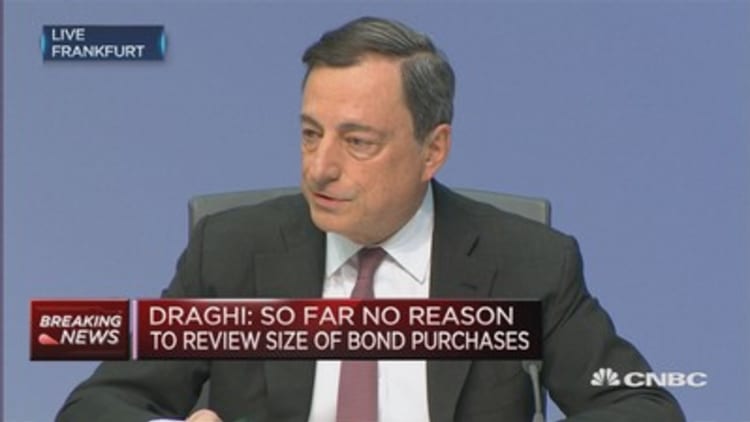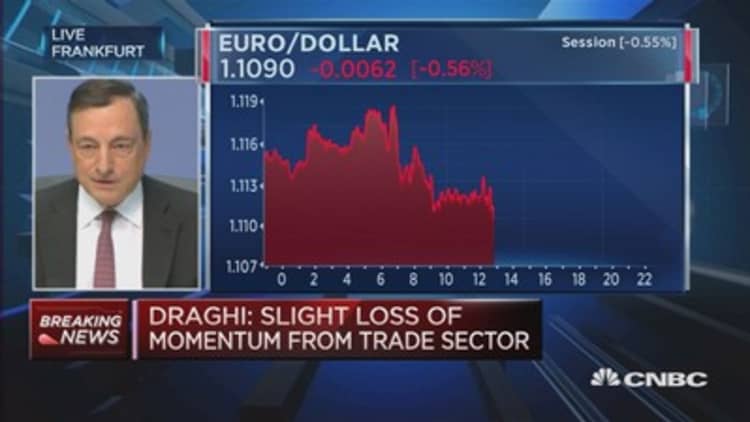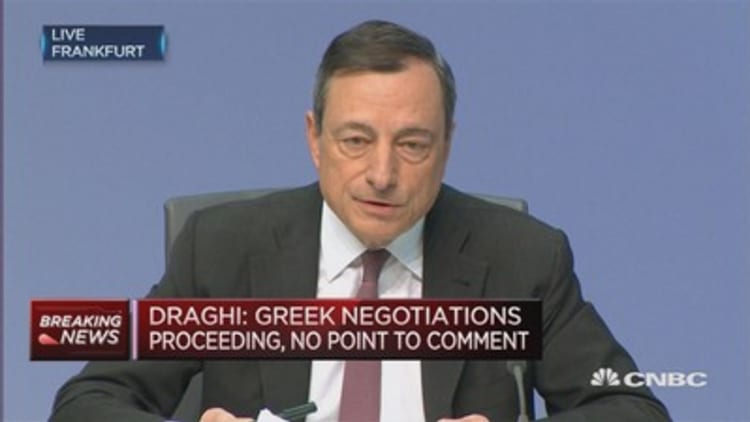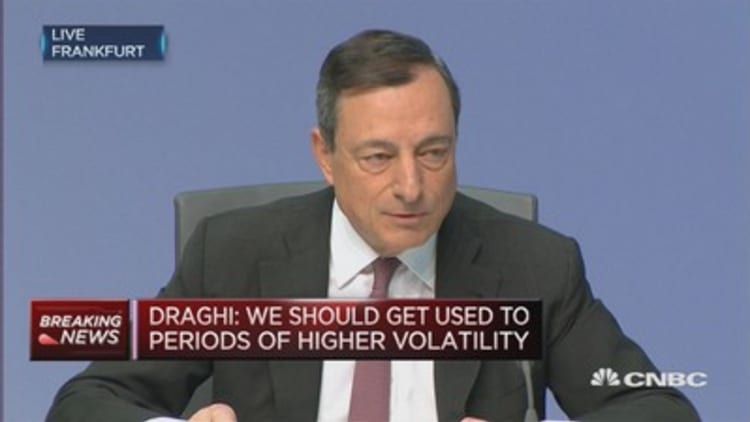



European Central Bank President Mario Draghi quelled any fears of an earlier-than-expected end to its bond-buying plans, as he upgraded short-term inflation forecasts.
Draghi said the ECB's Governing Council was not even discussing an "exit strategy" for its 60 billion euro ($67 billion)-a-month program, adding that there was still a "long way to go" before the central bank reached its inflation target of close to 2 percent.
"We have to look through the medium term, until the objectives has been reached in a sustained fashion," Draghi said, speaking at the ECB's monthly press conference, following the bank's rate decision.
The ECB projected annual inflation at 0.3 percent in the euro area in 2015, 1.5 percent in 2016 and 1.8 percent in 2017. In comparison with the March 2015 ECB staff macroeconomic projections, the inflation projections have been revised upwards for 2015 and remain unchanged for 2016 and 2017.
Draghi said he was not surprised by the recent tick upwards in inflation as although it beat market expectations, it was in line with the ECB's own forecasts.
He said if anything, recent data had in fact "strengthened the governing council's conviction" in the size of the bond-buying plan and its previous monetary policy initiatives.
"The full implementation of all our monetary policy measures will provide the necessary support to the economic recovery in the euro area and lead to a sustained return of inflation rates towards levels below, but close to, 2 percent in the medium term," Draghi said.
Following a constant supply of strong economic data out of the euro zone in the last few months, just weeks after the European Central Bank President Mario Draghi launched of a much-anticipated bond-buying plan, some analysts had predicted that the ECB's quantitative easing program might be over sooner than originally thought.
Markets initially cheered the comments, with German and French stocks initially rallying over 1 percent before paring gains slightly. The euro edge higher against the dollar to trade around $1.11.
Rates left on hold
Earlier Wednesday, the European Central Bank left its key rates unchanged at record lows, with the central bank likely to focus on how the region's economy is doing under the continuing threat of a Greek debt default.
The central bank left its main interest rate unchanged at a record low of 0.05 percent, its deposit facility at -0.20 percent and the marginal lending facility at 0.3 percent.
Read MoreTake it or leave it: Will Greece accept deal?
After years of promises and various liquidity programs, Draghi announced in January that the bank would start to buy sovereign bonds in a quantitative easing (QE) program. The bank started its massive trillion euro bond-buying program on March 9.
Greece deal nearly there?
Greece was also unavoidable at the conference, as the indebted country is in the process of drawing up an agreement with its creditors.
Draghi said there was a general will to reach an agreement with Greece, as he refused to comment on the current state of Greece's negotiations with its euro zone lenders.
"There must be a strong financial agreement that addresses the remaining sources of instability in the financial sector," he said.
On Tuesday, the European Commission, European Central Bank (ECB) and International Monetary Fund (IMF) drafted the broad lines of an agreement to put to the Greek government, according to Reuters, in a bid to resolve months of tense negotiations over Greek reforms and debt.
A Greek government official told CNBC Wednesday that the Athens government hadn't yet seen the proposals, however.
Any offer of a deal from creditors puts the ball firmly in Greece's court, although the consequences of it rejecting an agreement could be dire.
Read MoreForget the confetti bomb, ECB faces a minefield
Athens faces a 300 million euro ($327.9 million) payment to the International Monetary Fund (IMF) on Friday, but there are fears the country cannot honor the debt without further financial aid.
-- CNBC's Holly Ellyatt contributed to this report
Follow us on Twitter: @CNBCWorld


